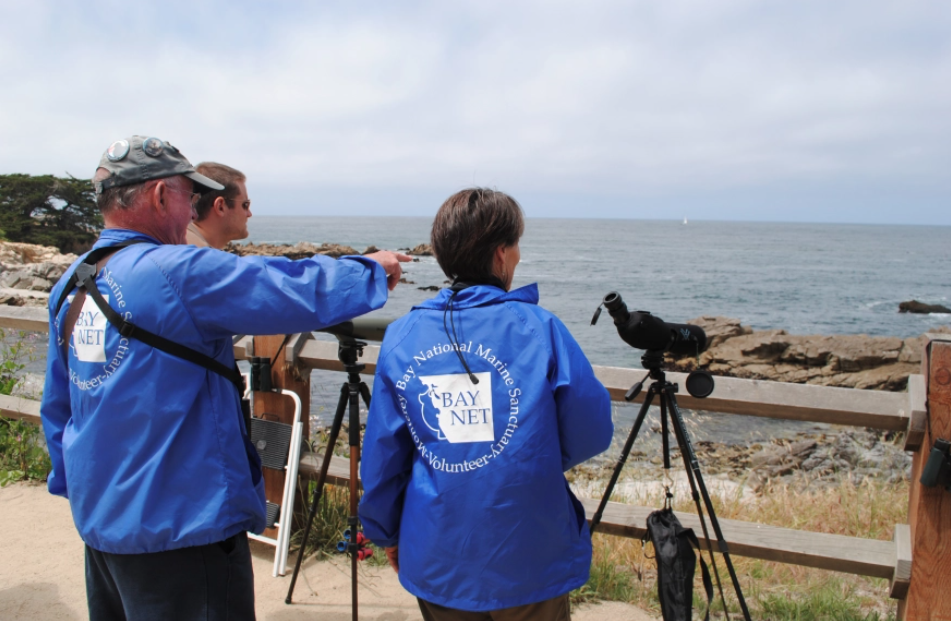
Blog: Finding Sanctuary – Volunteers looking out for harbor seals by: Lisa Wooninck

BayNet volunteer Craig Noke shares stories with the public about the sanctuary. (Contributed)
By: Lisa Wooninck
Published: Santa Cruz Sentinel, March 18, 2023
Monterey Bay National Marine Sanctuary boasts a high diversity of marine mammals (36 species) that are residents or passing through, making the sanctuary a wildlife viewer’s paradise. After being hunted to near extinction, some marine mammal species are rebounding and thriving on an abundance of marine food (plankton and small schooling fish) in Monterey Bay.
Many visitors to the area are unfortunately unaware that close encounters with marine mammals, such as seals and sea otters may disturb and harm these sensitive animals.
The Marine Mammal Protection Act, enacted in 1972, established a national policy to protect marine mammal populations, their ecosystems and natural habitats. In addition, the National Marine Sanctuaries Act prohibits the take (aka disturbance) of marine mammals within sanctuaries. These laws and a cadre of dedicated sanctuary volunteers help protect the sanctuary’s precious wildlife.

Bay Net volunteers, stationed along the sanctuary’s shore, and Team OCEAN (Ocean Conservation Education Action Network) volunteers, on the water in kayaks, are the sanctuary’s premier volunteer programs. These trained naturalists foster an understanding and appreciation for the sanctuary among visitors, while promoting respectful wildlife viewing of many animals, including sea lions, sea otters and birds.
You may have recently noticed a large number of plump sausages resting on rocks and beaches along our shore. These are harbor seals (Phoca vitulina) that have hauled out to rest, and to regulate their body temperature.
At night, they go off and dive in deep waters to forage. Harbor seals weigh up to 285 pounds and measure up to 6 feet long. Female harbor seals have begun to haul out on local beaches to give birth and nurse their pups during the annual pupping season of March to early June. Bay Net volunteers have monitored along the shoreline of Pacific Grove since 1995 and recognize “Dotty McScarbelly.” She is a well-known super mom, pupping successfully for 11 years consecutively.
Harbor seals are especially sensitive to noise. Observational data collected by Bay Net volunteers showed that fewer harbor seal moms used sections of Pacific Grove pupping beaches in the Spring of 2022; 20% less compared to 2021. The mortality rate for pups was higher at the beaches as well: 23 losses in 2022 compared to two in 2021.
A suspected cause of these declines was ‘noisy’ road construction that occurred adjacent to a Pacific Grove pupping beach. In large part because of the data collected by Bay Net volunteers, the Pacific Grove City Council in October 2022 unanimously passed an amended ordinance to avoid non-emergency road construction along Pacific Grove beaches during harbor seal pupping season.
Sanctuary volunteers provide an invaluable service by keeping an eye on our sanctuary and educating visitors to the area. In addition to Bay Net and Team OCEAN, you can volunteer for our First Flush and Snapshot Day Water Quality Monitoring Programs, or at one of our two visitor centers, the Sanctuary Exploration Center in Santa Cruz and our Coastal Discovery Center in San Simeon. To learn more about our volunteer opportunities, join a volunteer information session on March 22. To register for the webinar, visit attendee.gotowebinar.com/register or contact lisa.uttal@noaa.gov.
If you see disturbances, please call MBNMS emergency phone at 831-236-6797. For injured animals, contact the Marine Mammal Center at 831-633-6298.
Lisa Wooninck became the superintendent of NOAA’s Monterey Bay National Marine Sanctuary in 2021. She has a doctorate in ecology and evolutionary biology, and marine biology from UC Santa Barbara. She can be reached at lisa.wooninck@noaa.gov. To learn more about the sanctuary, visit https://montereybay.noaa.gov/.
